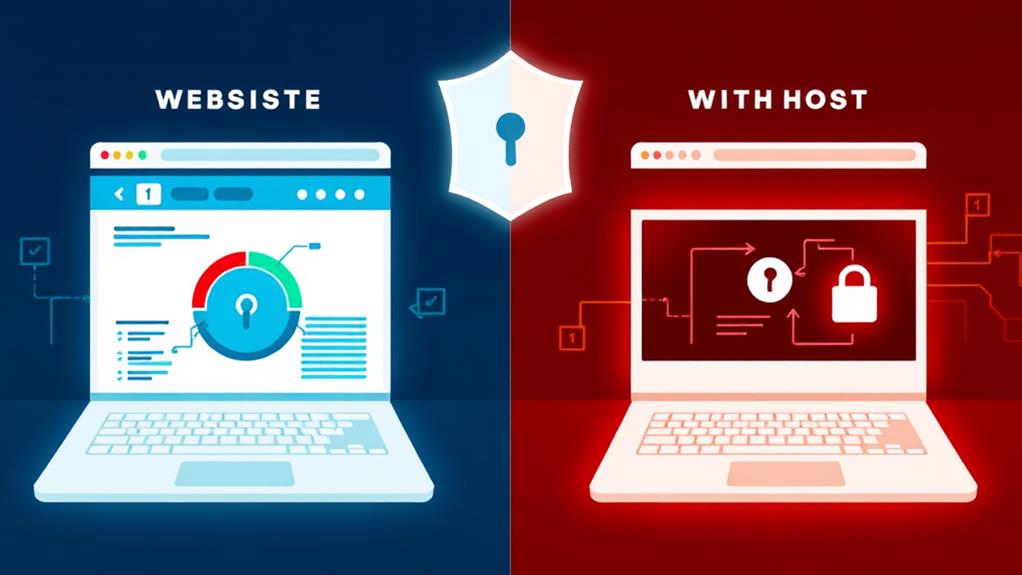When contemplating whether a website host is necessary, it's essential to think about the fundamental role a hosting service plays in the online presence of your website. The decision of whether to utilize a hosting provider goes beyond mere storage; it impacts the availability, security, and overall performance of your website. Recognizing the importance of a reliable host is key to making informed choices that can influence your website's success and user experience.
Key Takeaways
- A host is essential for website accessibility and reliability.
- Hosts provide technical support for issue resolution.
- Security measures safeguard websites from threats.
- Hosts offer flexibility for website scalability.
- Hosts handle technical maintenance tasks for websites.
Importance of Web Hosting
The significance of web hosting in establishing and maintaining a successful online presence cannot be exaggerated. Server reliability plays a vital role in guaranteeing that your website is consistently accessible to visitors. When selecting a web hosting service, it is essential to take into account the uptime guarantee provided by the provider. A dependable hosting service will guarantee that your website remains online and functional, reducing the risk of downtime that could potentially damage your online reputation and business operations.
Moreover, customer support is another fundamental aspect of web hosting that should not be underestimated. In case of technical issues or inquiries concerning your hosting service, having access to dependable customer support can make a notable difference in resolving issues promptly.
Search for a hosting provider that offers 24/7 customer support through various channels such as live chat, phone, or email to make sure that assistance is readily available whenever necessary.
Factors to Consider
Considering the wide array of options available in the web hosting market, it is vital to carefully evaluate various factors before making a decision that aligns with the specific needs of your website. One key aspect to take into account is the cost comparison among different hosting providers. It is important to assess the pricing structures, including any hidden fees, to make sure that you are getting the best value for your budget.
Another significant factor is the level of technical support offered by the hosting provider. Technical issues can arise at any time, so having reliable and responsive technical assistance is essential for maintaining the functionality of your website.
Look for hosting companies that offer 24/7 support through different channels such as live chat, phone, or email.
Benefits of Having a Host
An essential component for establishing a successful online presence is having a reliable web hosting service. When considering the benefits of having a host, server reliability and customer support play a pivotal role in guaranteeing a seamless experience for website owners.
Here are five key advantages of having a web hosting service:
- Server Reliability: A reputable host offers high uptime guarantees, ensuring your website is consistently accessible to visitors.
- Customer Support: Reliable hosts provide 24/7 support to assist with any technical issues or questions you may have.
- Security: Hosting services often include robust security measures to safeguard your website from cyber threats.
- Scalability: Hosting services offer flexible solutions, allowing your website to grow as your needs evolve.
- Technical Maintenance: Hosts handle server maintenance tasks, freeing you from the technical complexities of managing a server.
Having a host not only guarantees your website's stability and security but also provides the necessary support to help you navigate the digital terrain efficiently.
Types of Hosting Services
In the world of web hosting services, a diverse array of options exists to cater to the varying needs and preferences of website owners. Shared hosting is a popular choice where multiple websites share resources on a single server. This option is cost-effective and suitable for small to medium-sized websites with moderate traffic. Shared hosting is ideal for beginners or those with budget constraints.
On the other hand, dedicated servers provide exclusive access to all server resources for a single website. This option offers high performance, improved security, and full control over server configurations. Dedicated servers are recommended for large websites with high traffic volumes, e-commerce platforms, or applications that require substantial computing power.
Whether opting for shared hosting or dedicated servers, website owners must consider factors like traffic volume, technical know-how, security needs, and budget constraints to make an informed decision that aligns with their specific requirements. The choice between these hosting services will have a significant impact on the website's performance and user experience.
Making the Right Choice
Moving forward from discussing the types of hosting services available, the task of making the right choice for your website's hosting needs demands careful consideration and evaluation. When deciding on the best hosting option for your website, consider the following:
- Free options: Check out free hosting services, but keep in mind the limitations they may have regarding storage, bandwidth, and customization options.
- Self-hosting: If you have the necessary skills and resources, consider self-hosting your website for greater control and flexibility.
- Uptime guarantees: Look for hosting providers that offer reliable uptime assurances to make sure your website is accessible to visitors at all times.
- Scalability: Choose a hosting plan that allows for easy expansion as your website grows in traffic and content.
- Security features: Prioritize hosting providers that offer strong security measures to safeguard your website from cyber threats.
Frequently Asked Questions
Can I Host a Website Without a Hosting Service?
When considering the option of self-hosting a website without a hosting service, it is important to note that there are self-hosting options available. However, opting for self-hosting comes with built-in security risks.
Without the robust security measures provided by professional hosting services, managing security vulnerabilities, updates, and potential cyber threats becomes the sole responsibility of the website owner. This can be a complex and challenging task for those without the required skills.
What Happens if I Exceed My Hosting Plan's Limits?
Exceeding the limits of your hosting plan may result in bandwidth overage or resource limitations, potentially impacting the performance and availability of your website.
It is essential to monitor usage regularly and consider upgrading your plan to accommodate increased traffic or resource demands.
Failing to address these issues promptly could lead to downtime or reduced functionality, negatively affecting user experience and potentially hindering your online presence.
Is It Necessary to Purchase a Domain Name Separately?
In the domain of website ownership, domain registration stands as a crucial step for establishing an online presence. The acquisition of a domain name serves as the virtual address through which users access your website.
Furthermore, a registered domain name boosts website security by providing a unique identity and instilling trust among visitors. Therefore, buying a domain name separately is indispensable for maintaining control over your online brand and ensuring a secure browsing experience for users.
Are There Any Hidden Fees in Web Hosting Plans?
When considering web hosting plans, it is vital to assess pricing transparency and contract obligations. Some providers may advertise low initial costs but include hidden fees for essential features like SSL certificates or website backups. It is important to thoroughly review the terms and conditions to avoid surprises.
For example, a client signed up for a basic plan only to discover additional charges for email hosting. By grasping the pricing structure and contract terms, individuals can make informed decisions.
How Often Is Website Data Backed up by the Host?
Website data backup frequency varies among hosting providers, with many offering daily backups for improved data security. Regular backups are essential to safeguard against data loss due to human error, cyber threats, or system failures.
It is recommended to inquire about the backup frequency and retention policies of your chosen host to guarantee that your website data is sufficiently protected and can be restored in case of any unforeseen events.
Conclusion
In conclusion, the importance of having a dependable web hosting service for your website cannot be exaggerated. It guarantees accessibility, security, and scalability, all of which are essential for maintaining an effective online presence. By carefully considering factors such as server resources, technical support, and pricing, you can make an informed decision on the type of hosting service that best suits your needs. Choose wisely to guarantee the best performance and success of your website.









